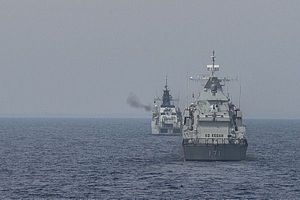Last year, Indonesia, Malaysia, and the Philippines reached agreement on limited, coordinated trilateral patrols in the Sulu Sea following a meeting in Bali (See: “New Sulu Sea Trilateral Patrols Officially Launched”).
As I have written before, the Sulu Sea – or, more specifically, the one million square kilometer tri-border area in the Sulu-Sulawesi Seas between the southern Philippines, Indonesia, and Malaysia – has long been a hub for transnational organized crime and terrorist threats (See: “Confronting Threats in the Sulu-Sulawesi Seas: Opportunities and Challenges”). The agreement by the three Southeast Asian states to undertake trilateral patrols in the Sulu-Sulawesi Seas following a recent spate of kidnappings had led some to believe that they would be underway quite quickly.
In fact, though some inroads have been made, defense officials have indicated that trilateral patrols are in the final stages of being worked out but have still yet to officially begin. That is no surprise. As I have mentioned before, sensationalist news stories about such patrols tend to gloss over the challenges inherent in operationalizing them, from the types of patrols being conducted to specific arrangements around crossing borders to pursue criminals.
But this week, Philippine Defense Secretary Delfin Lorenzana got a bit more specific. Speaking at a news conference, Lorenzana said the three countries had agreed to a joint patrol of an area to protect commercial vessels passing through. “We are inaugurating sometime in April or May a joint patrol of the three nations in that area,” he said.
Not much else was provided in the way of specifics, which are important in this kind of initiative. Nonetheless, Lorenzana’s rough timeline does indicate that we could soon see these patrols actually become a reality later this year.
Interestingly, Lorenzana also mentioned that he had told Vietnam’s envoy to the Philippines to arm the country’s crewmen when passing through nearby waters or coordinate with Philippine authorities to help prevent future incidents, as was the case when six Vietnamese seamen were attacked on their cargo ship last month.
As I have noted before, even though the patrols as currently envisioned would only involve the three countries, there is also potential for greater collaboration with other countries in the region as well as beyond, even though rhetoric needs to be distinguished from reality (See: “Can China Patrols Help Duterte in the Philippines’ Terror War?”).































